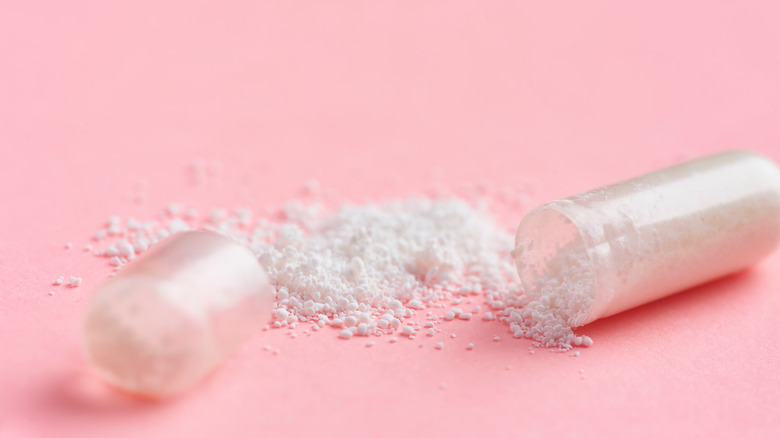
By Paige McBride/Aug. 30, 2021 12:56 pm EDT
Food trends can leave people rushing to purchase various supplements that they sometimes really need — and sometimes, really don’t. Especially as gut health has taken center stage in the wellness industry, many may find themselves reaching for probiotics more often than they need to. Indeed, according to Mindbodygreen, by maintaining a diverse stream of gut-healthy bacteria, you can more effectively support your body’s overall functioning.
Essentially, there are two sources that can offer the highest amount of probiotics — your foods and a supplement. The outlet notes that, for people who are stressed or don’t eat a diet rich in biodiversity, a probiotic pill can be extremely helpful. Particularly if you need a specific strain of the bacteria, choosing a supplement that’s right for you can be especially supportive for your gut health. Using the supplement for this or while you travel may be good for you if you need an extra boost.
“If you’re looking to elevate and diversity your gut microbiome, a targeted probiotic rooted in science is not only prudent, it’s indicated,” the outlet’s director of scientific affairs Ashley Jordan Ferira, Ph.D., RDN, explains. However, if you get enough probiotics from your diet, you may not need a probiotic or require a different strain.
Probiotics can fight specific illnesses
If you’re looking to combat a specific ailment, taking a targeted probiotic could be right for you as well. VeryWell Fit reports that people suffering from digestive issues, lactose intolerance, high blood pressure, yeast infections and high cholesterol can benefit from the right type of supplement. From here, you can choose your vehicle from a powder, capsule, pearls or from your food, the outlet notes.
Mindbodygreen reports that eating fermented foods provide natural gut-healthy bacteria. These include kimchi, sauerkraut, pickled vegetables and yogurt. “In addition to the probiotic advantage of these unique fermented foods, you also glean their macro-, micro-, and phytonutrient benefits,” Dr. Ferira tells the outlet.
Lastly, ingesting prebiotics helps support probiotics in your system by nourishing their growth. The outlet explains that prebiotics are just fiber that isn’t readily digestible. These organisms supply the gut with the nutrition they need to grow. “In other words, prebiotics are breakfast, lunch, and dinner for probiotics, which restores them and can improve GI health,” Ella Davar, R.D., CDN explains.
“Fiber is a major nutrient gap in the U.S., so prebiotic fiber from food and high-quality supplements like flaxseed, inulin, and others not only helps nourish the gut but addresses a widespread inadequacy at the same time,” says Dr. Ferira.
By broadening your spectrum of gut-healthy probiotics, you can more effectively absorb the nutrients from your food and feel your best.
Source: Read Full Article

